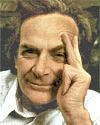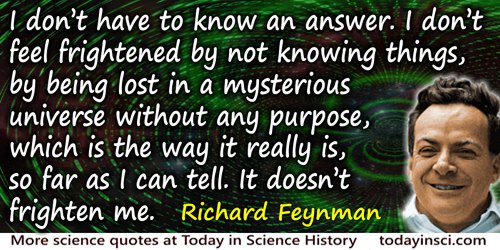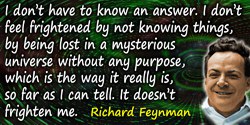 (source)
(source)
|
Richard P. Feynman
(11 May 1918 - 15 Feb 1988)
American theoretical physicist who was probably the most brilliant, influential, and iconoclastic figure in his field. His lifelong interest was in subatomic physics. In 1965, he shared the Nobel Prize in Physics for his work in quantum electrodynamics.
|
Richard P. Feynman Quotes on Mystery (6 quotes)
>> Click for 116 Science Quotes by Richard P. Feynman
>> Click for Richard P. Feynman Quotes on | Atom | Discovery | Imagination | Knowledge | Law | Nature | Physics | Problem | Science | Theory | Thinking | Universe |
>> Click for 116 Science Quotes by Richard P. Feynman
>> Click for Richard P. Feynman Quotes on | Atom | Discovery | Imagination | Knowledge | Law | Nature | Physics | Problem | Science | Theory | Thinking | Universe |
But I don’t have to know an answer. I don’t feel frightened by not knowing things, by being lost in a mysterious universe without any purpose, which is the way it really is, so far as I can tell. It doesn’t frighten me.
— Richard P. Feynman
In Richard Feynman and Jeffrey Robbins (ed.), The Pleasure of Finding Things Out: The Best Short Works of Richard Feynman (1999), 25, last sentence of Chap. 1. The chapter, with the same title as the book, is an edited transcript of an interview with Feynman made for the BBC television program Horizon (1981).
First, [Newton’s Law of Universal Gravitation] is mathematical in its expression…. Second, it is not exact; Einstein had to modify it…. There is always an edge of mystery, always a place where we have some fiddling around to do yet…. But the most impressive fact is that gravity is simple…. It is simple, and therefore it is beautiful…. Finally, comes the universality of the gravitational law and the fact that it extends over such enormous distances…
— Richard P. Feynman
In The Character of Physical Law (1965, 2001), 33.
God was always invented to explain mystery. God is always invented to explain those things that you do not understand. Now, when you finally discover how something works … you don't need him anymore. But … you leave him to create the universe because we haven't figured that out yet.
— Richard P. Feynman
Interview, collected in Paul C. W. Davies and Julian R. Brown (eds.) Superstrings: A Theory of Everything? (1988), 208-209.
On the contrary, God was always invented to explain mystery. God is always invented to explain those things that you do not understand. Now when you finally discover how something works, you get some laws which you're taking away from God; you don't need him anymore. But you need him for the other mysteries. So therefore you leave him to create the universe because we haven't figured that out yet; you need him for understanding those things which you don't believe the laws will explain, such as consciousness, or why you only live to a certain length of time—life and death—stuff like that. God is always associated with those things that you do not understand. Therefore, I don't think that the laws can be considered to be like God because they have been figured out.
— Richard P. Feynman
Quoted in P. C. W. Davies and Julian Brown (eds.), Superstrings: A Theory of Everything? (1988), 208-9.
Poets say science takes away from the beauty of the stars—mere globs of gas atoms. Nothing is “mere.” I too can see the stars on a desert night, and feel them. But do I see less or more? The vastness of the heavens stretches my imagination—stuck on this carousel my little eye can catch one-million-year-old light. A vast pattern—of which I am a part. … What is the pattern, or the meaning, or the “why?” It does not do harm to the mystery to know a little about it. For far more marvelous is the truth than any artists of the past imagined it. Why do the poets of the present not speak of it? What men are poets who can speak of Jupiter if he were a man, but if he is an immense spinning sphere of methane and ammonia must be silent?
— Richard P. Feynman
In 'Astronomy', The Feynman Lectures on Physics (1961), Vol. 1, 3-6, footnote.
There are all kinds of interesting questions that come from a knowledge of science, which only adds to the excitement and mystery and awe of a flower.
— Richard P. Feynman
From interview by BBC TV in episode 'The Pleasure of Finding Things Out', Horizon (1981). Collected in Richard P. Feynman, 'The Making of a Scientist', What Do You Care What Other People Think?": Further Adventures of a Curious Character (2001), 11.
See also:
- 11 May - short biography, births, deaths and events on date of Feynman's birth.
- Richard Feynman on The French Curve: a reflection on thinking inside the box.
- Genius: The Life and Science of Richard Feynman, by James Gleick. - book suggestion.
- Booklist for Richard Feynman.




 In science it often happens that scientists say, 'You know that's a really good argument; my position is mistaken,' and then they would actually change their minds and you never hear that old view from them again. They really do it. It doesn't happen as often as it should, because scientists are human and change is sometimes painful. But it happens every day. I cannot recall the last time something like that happened in politics or religion.
(1987) --
In science it often happens that scientists say, 'You know that's a really good argument; my position is mistaken,' and then they would actually change their minds and you never hear that old view from them again. They really do it. It doesn't happen as often as it should, because scientists are human and change is sometimes painful. But it happens every day. I cannot recall the last time something like that happened in politics or religion.
(1987) -- 


